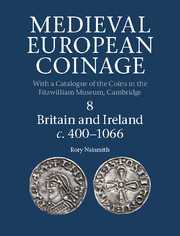Book contents
- Frontmatter
- Contents
- List of plates
- List of figures
- List of maps
- List of tables
- Preface
- Note on spelling
- List of abbreviations
- 1 Introduction
- 2 From Roman Britain To Anglo-Saxon England
- 3 Early Anglo-Saxon Gold Coinage
- 4 The Early Silver Pennies
- 5 The Kingdom Of Northumbria
- 6 The ‘Mercian Supremacy’ In The Age Of Offa And Coenwulf
- 7 The Rise Of Wessex In Southern England
- 8 The Reign Of Alfred The Great
- 9 England From Edward The Elder To Edgar's Reform
- 10 The Late Anglo-Saxon Coinage
- 11 The Anglo-Viking Coinages
- 12 Wales And Scotland
- 13 The Isle Of Man And ‘Irish Sea’ Coinages
- 14 Ireland To 1170 (with Andrew Woods)
- APPENDICES
- Bibliography
- CATALOGUE
- Concordances
- Indexes
4 - The Early Silver Pennies
Published online by Cambridge University Press: 11 May 2017
- Frontmatter
- Contents
- List of plates
- List of figures
- List of maps
- List of tables
- Preface
- Note on spelling
- List of abbreviations
- 1 Introduction
- 2 From Roman Britain To Anglo-Saxon England
- 3 Early Anglo-Saxon Gold Coinage
- 4 The Early Silver Pennies
- 5 The Kingdom Of Northumbria
- 6 The ‘Mercian Supremacy’ In The Age Of Offa And Coenwulf
- 7 The Rise Of Wessex In Southern England
- 8 The Reign Of Alfred The Great
- 9 England From Edward The Elder To Edgar's Reform
- 10 The Late Anglo-Saxon Coinage
- 11 The Anglo-Viking Coinages
- 12 Wales And Scotland
- 13 The Isle Of Man And ‘Irish Sea’ Coinages
- 14 Ireland To 1170 (with Andrew Woods)
- APPENDICES
- Bibliography
- CATALOGUE
- Concordances
- Indexes
Summary
HISTORICAL INTRODUCTION
The later seventh and early eighth centuries are remembered as a period of dynamic cultural change in the Anglo-Saxon kingdoms. After the initial pioneering phase of Christian conversion in the early and mid-seventh century, a multitude of churches sprang up. These institutions were responsible for a remarkable series of artistic and intellectual achievements (Blair 2005, chaps. 2–5; Mayr-Harting 1991), including the Lindisfarne Gospels, the Codex Amiatinus, the Franks Casket and the Northumbrian stone crosses of Bewcastle and Ruthwell. They also produced authors of international renown such as the venerable Bede (d. 735), Aldhelm of Malmesbury (d. 709/10) and Cædmon (Webster and Backhouse 1991, chaps. 2–5; Wormald 1982a; Higham and Ryan 2013, 126–78). Thanks to these writers a rich range of textual sources becomes available for the first time. Learning flourished in Anglo-Saxon churches, and English missionaries, themselves only secondor third-generation Christians, played a major role in consolidating Christianity in what is now Germany and the Netherlands (McKitterick 1991).
Politically, England at this time comprised a large number of peoples or kingdoms, as had been the case earlier in the seventh century (much of the literature cited in Chapter 3, section (a), pp. 39–42 remains applicable; see also Map 2, p. 41). These units varied in size and their degree of autonomy. At least a dozen territories had rulers regularly described as ‘kings’ (reges) in the seventh century (Yorke 2014), but identification as an independent king or kingdom depended on specific relationships and situations: it was not an absolute status (Dumville 1989a; 1997b). All the larger kingdoms consisted of a number of smaller segments bound together by force and shared tradition. Northumbria, Kent and East Anglia, for example, all included at least two major segments: Bernicia and Deira in Northumbria, east and west Kent (manifested in the separate dioceses of Canterbury and Rochester), and Norfolk and Suffolk in East Anglia (again reflected in the two bishoprics of Elmham and Dunwich) respectively. Even these larger political entities could prove fragile.
- Type
- Chapter
- Information
- Medieval European Coinage , pp. 63 - 110Publisher: Cambridge University PressPrint publication year: 2017

